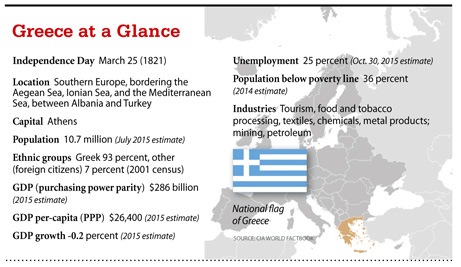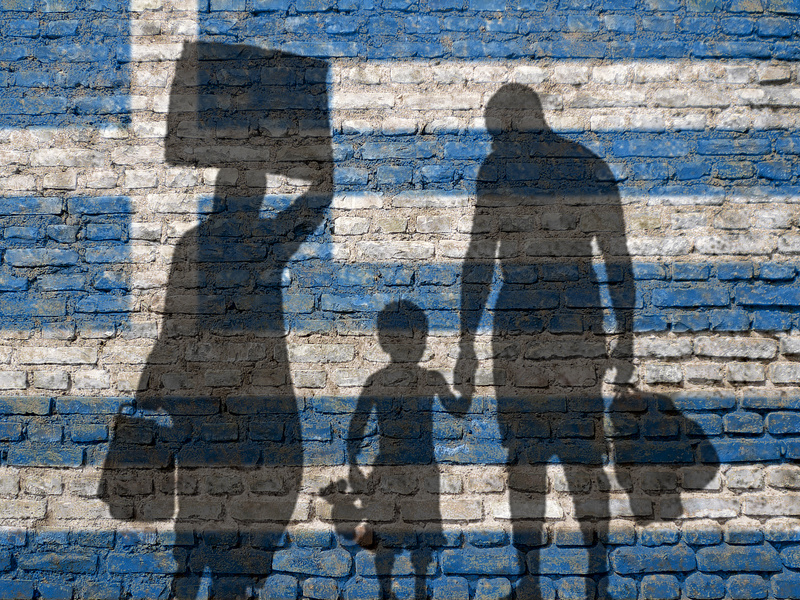What should Greece expect from the upcoming- Ambassador Lalacos’ interview
Overwhelmed Greece Pleads for Help Ahead of U.N. Refugee Summit
By Larry Luxner
In mid-June, the Greek island of Lesbos hosted U.N. Secretary-General Ban Ki-moon for a firsthand look at what has sadly become the “ground zero” of Europe’s worst humanitarian crisis since World War II.
“Today, I met refugees from some of the world’s most troubled places. They have lived through a nightmare, and that nightmare is not over,” said Ban, speaking at the Kara Tepe refugee camp ahead of June 20, World Refugee Day. “But here in Lesbos, they have found relief from war and persecution.”
Praising the hospitality that the 90,000 residents of Lesbos have shown 600,000 or so war-weary Syrians, Iraqis and others who have passed through this popular resort island about the size of Frederick County, Md., on their way to the European mainland, the U.N. chief insisted that “detention is not the answer” and demanded that it end immediately.
“One of the most beautiful words in the Greek lexicon is philoxenia — friendship toward strangers,” he said. “Let us work together to resettle more people, provide legal pathways and better integrate refugees. I recognize the difficulties. But the world has the wealth, the capacity and the duty to meet this challenge.”
Later this month, just how much philoxenia the world has to offer will be put to the test at the U.N. Summit for Refugees and Migrants. Organizers say the unprecedented Sept. 19 event is “a watershed moment to strengthen governance of international migration” and a “unique opportunity for creating a more responsible, predictable system” to deal with what has become the largest movement of people since the Second World War.
And the next day — on the margins of the U.N. General Assembly — President Obama will host the Leaders’ Summit on Refugees in an effort to cajole governments around the world to pony up billions of dollars in humanitarian aid, admit more refugees through resettlement programs and provide them with expanded educational and work opportunities.
“Because it’s a global issue, we are glad this will be a global conference,” said Haris Lalacos, Greece’s new ambassador to the United States. “It’ll be held at the U.N. at a time when world leaders will be in New York for the annual General Assembly. We expect this conference to raise awareness globally about the extent of this issue, about its roots and about ways to address it in a long-term fashion.”
Lalacos, 59, presented his diplomatic credentials to President Obama on June 27. Three weeks later, The Washington Diplomat grilled him for an hour about everything from the refugee crisis to the financial crisis, which one year ago saw Greece teetering dangerously close to expulsion from the 28-member European Union; in fact, Grexit was a word long before Brexit.
“We need to stress that this refugee-migrant crisis is a global issue. We do not see it as bilateral or even regional,” he said. “It requires an international approach to a long-term solution, and this has not happened yet.”
 Far from it, in fact.
Far from it, in fact.
The crisis has threatened to unravel decades of European solidarity. Over 1 million migrants streamed into Europe by sea last year in a desperate, dangerous journey to escape violence and poverty in Syria, Afghanistan, Iraq and elsewhere, with thousands dying along the way. The unprecedented surge led to a populist backlash throughout Europe, as far-right parties gained steam in France, Austria, Poland and, notably, Britain, where voters decided to sever the U.K. from the European Union in part because of concerns over unchecked immigration.
Meanwhile, the EU has struggled to spread the immigration burden among member states. Countries such Germany and Sweden have taken in a disproportionate share of refugees, while others such as Hungary threw up fences, fearing that an influx of Muslims would contribute to radicalism and job losses at home.
As even once-hospitable nations closed their doors, tens of thousands of refugees were left stranded in Greece, which has found itself on the frontlines of an international crisis while still battling its own domestic economic crisis (also see related story on refugees in Greece).
Greece — saddled with €320 billion in debt and massive unemployment as a consequence of the eurozone’s 2008 financial meltdown — is now witnessing its largest influx of refugees since the 1920s. More than a million people in search of a safe haven have transited Greece since early 2015. Gateway islands such as Lesbos have seen tourism plummet, while Greece’s cash-strapped government struggles to process asylum claims, build housing and rescue migrants at sea.
Officials in Athens complain that promises of significant EU aid have yet to materialize. A March agreement between Turkey and the EU, however, has dramatically reduced the flow of migrants into Greece. Under that €5 billion deal, for every Syrian refugee smuggled into Greece who is shipped back to Turkey by the EU, the bloc must accept one vetted Syrian refugee from a camp in Turkey. In return, Ankara is supposed to receive billions of dollars in EU assistance and accelerated talks on visa-free travel and EU membership. A previous EU plan to redistribute 160,000 asylum-seekers from Greece and Italy to other member states fell apart following objections from Hungary and other Eastern European countries.
As a result of the EU-Turkey pact, migrants shifted their focus and began embarking on the more perilous route from Libya to Italy. Even though crossings via the Aegean Sea have been sharply curtailed, the deal hasn’t resolved the problem of what to do with the people already stuck in Greece.
The problem has gotten even worse since the failed coup attempt against Turkish President Recep Tayyip Erdogan. Greek officials say arrivals have jumped by 76 percent since the military’s July 15 uprising, with the number of stranded asylum-seekers exceeding 50,000 for the first time ever. Erdogan now threatens to pull out of the agreement altogether in the wake of EU criticism over his latest crackdown on dissenters.
“Right now, refugees need all the help they can get,” Yanis Papadimitriou reported for Deutsche Welle. “Disputes have arisen in the overfilled camps, where supplies are short. Recently, refugees caused an uproar in Greece when they vociferously demanded the opening of the borders to let them out.”
This heartbreaking issue is nothing new to Lalacos, who dealt with refugees at his last assignment heading the Greek diplomatic mission in Skopje, capital of Macedonia.
“It was the first country people would enter after they left Greece, but it also gradually implemented restrictions on the flow of refugees, and the border now covers most accessible places,” said the ambassador, who for political reasons calls his northern neighbor the Former Yugoslav Republic of Macedonia (FYROM). “Even where there is a fence, a small number of people will try to sneak out of Greece — precisely because they want to go to certain northern and western European countries, and they will do anything to get there.”
Lalacos spent three and a half years in Skopje before coming to Washington. And before Skopje, he was posted to Ankara as head of the Greek Embassy in Turkey.
For a number of years, 50,000 to 70,000 foreigners arrived in Greece annually via Turkey. But last year, total arrivals jumped to nearly a million.
“These were unprecedented numbers which no one could have foreseen, even at the beginning of 2015,” said Lalacos, declining to predict how many refugees might wash up on Greek shores this year. “So far, the EU agreement with Turkey is working. What has changed is the inability of these people to exit Greece, because the northern border has been sealed.”
Lalacos said Greece will need €1.8 billion (about $2 billion) this year, but that to date, it has received only €250 million in assistance — which is one reason it’s counting on pledges at the upcoming U.N. refugee summit.
“It’s not just a question of money, but also of relocation. The reason these people are stranded in Greece is because a very crucial part of the agreement between the EU and Turkey is not being implemented,” he said. “Namely, EU member states undertook an obligation to receive people, and this is happening very slowly and very painfully.”
Lalacos complained that “Greece has fully honored its EU commitments and has accepted more than the agreed quotas of people. But EU assistance has not been what we expected and what we need,” he said. “Unlike all the other countries to our north, which more or less sealed their land borders like the Balkan countries did, Greece can’t seal off its maritime border with Turkey. When it comes to the sea, you can patrol it and monitor activity, but when you see inflatable boats overcrowded with refugees, including older people, babies and the handicapped, the only thing you can do is rescue them.”
Ángela María Arbeláez, a Colombian-Greek humanitarian activist working in the field since September 2015, knows this more than most. Arbeláez, who was among the NGO leaders to greet Ban Ki-moon during his visit to the Kara Tepe refugee camp, says the Greek government has gone above and beyond the call of duty — and that Brussels must now step up to help the helpless.
“There is no short-term solution. Europe must open her borders,” she told The Diplomat in an email from Lesbos, urging the EU to recognize not only Syrian refugees but also Afghans and Iraqi Yazidis as displaced persons. “One solution would be more rapid processing of requests for asylum and family reunification so that the more than 57,000 refugees stranded in Greece can travel to their final destinations.”
Lalacos agrees that Greece has done more than its fair share, noting that this isn’t the first time his country opened its doors to desperate foreigners. In 1991, after Albania’s communist regime collapsed, some 20,000 Albanians poured across the border in northern Greece. But this is different, he said.
“The Albanians who came in the 1990s came because they wanted to live and work in Greece, and eventually they started blending into Greek society, having kids and sending them to Greek schools,” said the envoy. “But these people want only to transit through Greece, and that puts us in a very peculiar situation.”
He added: “Compared to other societies in Europe which have been extremely hostile to the notion of receiving even a few hundred migrants, Greeks are very open, despite the difficulties. The local population has made international news time and again, though this has had an adverse impact on tourism.”
That in turn has stung locals of popular destinations such Lesbos. Many residents offered refugees food, water and shelter, only to find their own jobs now in jeopardy as tourists avoid the island — even though most of the refugees have long since departed.
Ivan Vejvoda, a Serbian-born Balkan expert with the German Marshall Fund, traveled to Greece this summer and saw firsthand how local officials on the Aegean island of Kos are cooperating with their counterparts in Bodrum — a Turkish town across the water — to feed and shelter stranded refugees.
“There’s a lull now, but everyone knows this could be short-lived if the situation in Aleppo continues the way it does, so everyone’s on guard,” he warned, referring to the Syrian city besieged by rebel and government forces. “Greece is still in a deep economic crisis. They’ve lost 25 percent of their GDP and people have had their salaries cut dramatically. Yet there is a culture of hospitality, and I would say the Greeks are doing their utmost.”
Indeed, the migrant crisis has temporarily overshadowed Greece’s other big problem: its sick economy. After years of overextending itself on credit subsidized by low EU interest rates, the country went bust in 2009 when the magnitude of Greece’s debts and inefficient economy became clear. Despite a series of rescue packages totaling hundreds of billions of dollars, German-imposed austerity has hit Greeks hard. Roughly one out of every four remain jobless; social services have been slashed; suicides and drug use soared; and standards of living tumbled.
While EU finance ministers have significantly eased the terms under which Athens must repay its loans, Germany has thus far refused to consider an outright haircut on the debt that the International Monetary Fund says is unsustainable. Partly because the EU needs Greek help in stemming the refugee tide, however, it has been willing to cut Athens some slack. The eurozone has given the country new pledges of debt relief on top of those already authorized by Brussels. In return, the Tsipras government has agreed to continue difficult reforms such as spending cuts, higher taxes and the privatization of state assets from the post office to the power utility.
“Austerity is a painful process because it’s lasting too long, and because it’s based mostly on notions of austerity and fiscal responsibility, but without the counterbalancing element of economic growth,” said Lalacos. “So we feel that Greece has been caught in a vicious circle, and our main objective is to complement what we have agreed with the institutions with a new element of growth in the overall package that is being applied to the Greek economy.”
Even without this, he said, Greece is slowly improving. Overall tourist numbers are up, and the jobless rate has actually dropped —from a staggering 24 percent to a slightly less staggering 23 percent — though it still has Europe’s highest unemployment rate by far.
Lalacos said his government is also in the process of easing capital controls.
“We have gradually relaxed those controls in our banking system. Hopefully, we are moving to a full return to the status quo ante in a relatively short time,” he said. “For several years now, Greece is not borrowing new money. The agreement that we have is to be able to repay past loans. In fact, we are decreasing the debt, and we have primary budget surpluses which fiscally and socially are very tough to deliver — but it’s an agreement we made and are honoring it.”
Lalacos added: “We hope to be able to strike the right balance between fiscal responsibility and growth. We see this as the only way out of a very difficult situation.”
Yet he noted sadly that Greece has suffered negative growth for seven years in a row, most recently in 2015, when GDP fell by 1.5 percent. On the other hand, the IMF expects the economy to edge up by 0.5 percent this year, followed by growth of 1.7 percent in 2017. In this respect, Lalacos said he has reason to be cautiously optimistic, though Greece is clearly worried about the continent’s anemic economy as a whole, as well as Britain’s recent decision to pull out of the EU.
“There are some countries in Europe that underwent and are still undergoing very difficult times with budget deficits. We also see that we are in a continent which has very low rates of growth,” he said. “Because of the policies being followed, this has given rise to populism, ultra-nationalism and extreme political behavior in many, if not all, European countries. This needs to be addressed by statesmen across the continent.”
As to whether Brexit might eventually lead to Grexit, the ambassador thinks that scenario is highly unlikely, at least for now.
“There is no marked tendency among the Greek population to even entertain the thought of leaving the EU,” he told us. “Greek society is pro-European. Greece wants more, not less, Europe.”



















